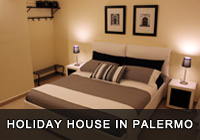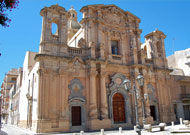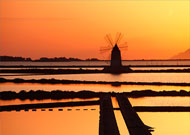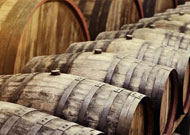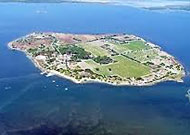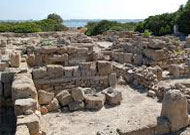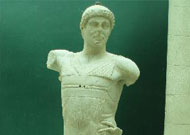|
Marsala is a seaport city located in the Province of Trapani on the island of Sicily in Italy. The low coast on
which it is situated is the westernmost point of the island. It is best known as the source of Marsala wine. Marsala occupies
the site of Lilybaeum, the principal stronghold of the Carthaginians in Sicily, founded by Himilco in 396 BC after the abandonment of Motya.
Neither Pyrrhus nor the Romans were able to reduce it by siege, but it was surrendered to the latter in 241 BC at the end of the First Punic War.
In the later wars it was a starting point for the Roman expeditions against Carthage, and under Roman rule it enjoyed considerable prosperity.
It obtained municipal rights from Augustus and became a colony under either Pertinax or Septimius Severus.The Saracens gave it its present name
"Marsala" which is deriving from the Arab "Marsa Allah" (port of Allah) or "Marsa Ali" ("port of Ali" intended also as "great port" as Ali in
Arabian language is synonymous of "great" and the ancient harbour of Lylibaeum was enormous). The ancient harbor that lay on the northeast was
destroyed by Charles V to prevent its occupation by pirates. The modern harbor lies to the southeast. On May 11, 1860, Giuseppe Garibaldi and
his "thousand" landed at Marsala and began his campaign to overthrow Bourbon rule in Sicily as a step toward Italy's unification.
Mozia this tiny island just off the coast north of Marsala was once the home of the Phoenician colony
that was expelled in 379 BC and founded Lilibeo (Marsala). The island's role in the events of Sicily's early Phoenician period (before 600 BC)
far transcended its diminutive size. The Phoenicians were a seafaring Semitic people from what is now Syria and Lebanon; they founded Carthage
and other Mediterranean coastal communities, such as Motia. Therefore, it was only natural that Motia, and then Lilibeo, should side with
Carthage in the wars against the Greeks. Ironically, the Greeks themselves owed much, including a great deal of their language and alphabet,
to the early Phoenicians, despite their later political differences with the Carthaginians. The island of Mozia, which is owned and operated
by a foundation established by the winemaking Whitaker family (who built the Anglican Church and Villa Malfitana in Palermo), has a
remarkable museum and the ruins of an equally remarkable civilization, complete with a harbor and cemetery. Some of the finds on display
in the museum have a distinctly Egyptian influence, while others seem almost Hellenic. Though certain of these items were brought to
Motia from Asia Minor, others were made locally, based on "foreign" influences. Mozia and its unique museum provide the visitor with
a rare unspoiled glimpse into Sicily's Phoenician past.
|
|

